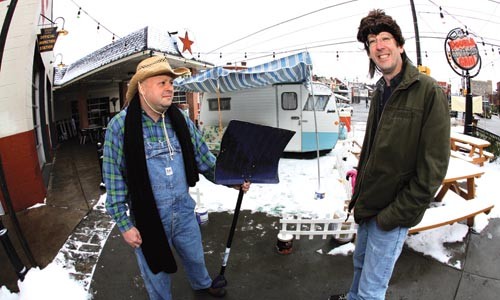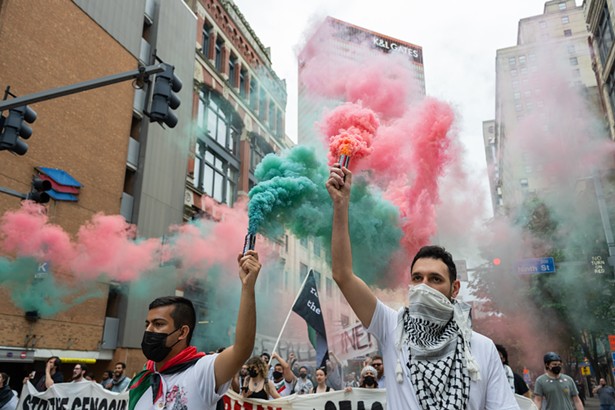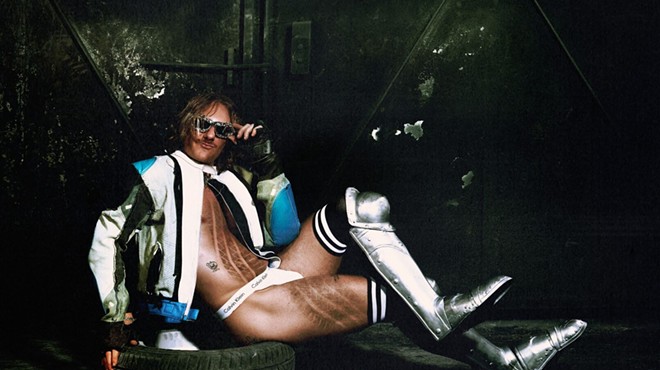The Double Wide Grill on East Carson Street is a restaurant in an old gas station with a white-trash theme. There are pink flamingoes out front and the menu includes an item called "Death Row Delmonico: The last thing you wanna eat before you die."
So when the restaurant's owners, Scott Kramer and Steve Zumoff, put a small white-and-blue travel trailer -- complete with awning and lawn furniture -- out front in November, they were surprised that anyone noticed.
But on Dec. 30, they got a visit from the city's Bureau of Building Inspection who, according to Kramer, told them to get an occupancy permit for the trailer within 30 days or have it removed.
Wayne Bossinger, BBI field operations manager, says the owners were sent a notice based on a Dec. 2 complaint about the trailer. "The area the trailer is parked in is an outdoor eating area," the complaint notes. "What is this trailer doing there and what purpose does it serve? ... Are people eating in the trailer? It is an eyesore and needs to be removed."
Bossinger says Kramer and Zumoff were told they would have to get an occupancy permit -- even though Kramer and Zumoff say it only serves a decorative purpose. The trailer, which is legally registered with the state Department of Motor Vehicles, is towed in front of the Grill during the winter months, when the restaurant's outdoor seating area is closed.
"The trailer is an antique display, a piece of art that goes with our theme," Kramer says. "We didn't receive any complaints until BBI says they were sent over."
BBI keeps the identity of complainants confidential, so there's no way to know who initiated the complaint. But Kramer and Zumoff say they have an idea.
"We asked him if [City Councilor] Bruce Kraus sent him over and he wouldn't say," Kramer says. "But we have our suspicions."
Kraus has been outspoken about reining in Carson Street's bar-crawl culture, they say. Among other initiatives, Kraus led an effort to curtail sidewalk food vending in the area -- and Double Wide was one of the businesses grilling food outdoors.
"Businesses are being targeted for a lot of different things, be it our trailer or selling food outdoors in the evenings," says Kramer. "Things have become a lot more restrictive down here and that makes it a lot harder to conduct business."
Kraus says he has nothing to do with the complaint: "I've heard some minor rumblings about the trailer, but I really am unfamiliar with the situation," he says. But he's not surprised that his name is the first one that popped into Kramer and Zumoff's heads.
"It's become very easy on the South Side for business owners to say, 'Oh, Bruce Kraus is at it again,'" says the councilor. "But I am very above board. If I have a problem with something you're doing, I'll come right to you and tell you straight to your face."
That's what happened with the grilling incident: "You have certain businesses that like to push the envelope and [Double Wide is] one of them," says Kraus. "They're a little on the edge, they're avant-garde -- not that that's a bad thing."
Kraus actually has some sympathy for Double Wide. Like many other South Side establishments, it is trying to attract a hip clientele, in a city historic district -- an area which, by design, tends to resist change.
"There are a lot of layers to compliance down there," Kraus says, "so it can at times be confusing."
Rick Belloli, executive director of the South Side Local Development Company, says the neighborhood is a diverse one -- from local businesses in an entertainment destination to residents, some of whom have been there for decades -- all living side-by-side, all with different visions of what the area should be.
Clashes are inevitable, he says.
"This is a neighborhood that is always seeking balance between a prosperous business community and a residential neighborhood," says Belloli. "What we have now is a neighborhood built on infrastructure that didn't envision where we'd be today when it was built at the turn of the century.
"So we have to try and have balance so one facet of our neighborhood doesn't overwhelm the other."
Thus the seeming paradox Double Wide finds itself in. It has to get an occupancy permit for a vehicle no one intends to occupy. And although it occupies the site of a former auto-repair garage, before it could display a vehicle, it had to get approval from the city's Historic Review Commission.
Carson Street is a designated city historic district, in which external changes to a property must be approved by the HRC. Located at 2339 E. Carson St., Double Wide is just inside the district's boundaries, which stretch between South Ninth and South 24th streets.
To display the trailer, Kramer and Zumoff needed a "Certificate of Appropriateness" from the commission. They pled their case in front of four commissioners on Jan. 6: With no debate and little discussion, the commission granted Double Wide permission to display the trailer from Nov. 1 to March 18, the day after St. Patrick's Day. Bossinger confirms that Double Wide has applied for the occupancy permit, and that a decision is pending.
"The South Side is a fun neighborhood, it's an entertainment district," says Kramer. "Look at the cities who have districts like this -- the Flats in Cleveland, Beale Street in Memphis -- they're embraced by their cities as tourist areas. We're very lucky to have it and it should be appreciated for what it is, not over-regulated. We shouldn't be fighting over whether we can sell food on the street or putting things on our property."
But Kraus says those places wrestle with the same issues the South Side does. "A lot of municipalities are dealing with the struggle of keeping alcohol-saturated business zones safe, clean and vibrant," he says. "The South Side has two economies -- a daytime 9-to-5 and a nighttime 9-to-5. We have to find a way for those two economies to coexist and be respectful of one another."
Belloli adds that while business owners may chafe under the South Side's unique restrictions, if it weren't for the historic district, there'd be no business there at all.
The district "really was a key asset to revitalizing the neighborhood," says Belloli. "And while sometimes small independent business owners find themselves bumping up against it, you can't underestimate the value of it." In the early 1980s, retail vacancy rates along Carson were nearly 50 percent, he says. But historic designation brought the programs like Main Street revitalization, and tax credits for rehabbing vacant properties.
"Without historic designation, what we have today would not have been possible," Belloli says.
Still, Kraus agrees that less antagonism would help everyone. To create a more collaborative approach to the area's problems, he had a legislative intern develop a 95-page plan titled, "Inviting, Safe, And Cohesive: A Proposal For The Management Of The South Side Using Responsible Hospitality Practices."
The plan stresses the need for adequate policing of the area, but also suggests that "late-night business owners" receive "recognition [for] their important contributions to the South Side." It also suggests a community-review process, in which locals can discuss their "values and expectations" for the neighborhood.
The plan seeks "to create a hospitable environment for entertainment in multi-use economies" by finding "collaborative solutions for managing an entertainment district."
"The whole idea behind responsible hospitality is getting together and working together deliberately in advance of a problem," Belloli says.
And maybe the next time someone has a gripe with Double Wide's trailer, they'll feel more comfortable telling Kramer and Zumoff to their face.














